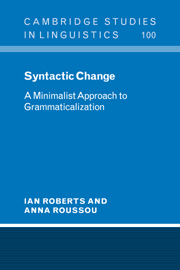3 - C elements
Published online by Cambridge University Press: 22 September 2009
Summary
Introduction
In Chapter 2 we discussed three well-known cases which involve reanalysis of a verb to an auxiliary element, an affix, or a particle. All three cases share reanalysis of V to a T element. In the Romance case, though, habeo further reduced to a suffix, while in Greek thelo became a particle arguably in the C system, thus following the V > T > C reanalysis path. In this chapter, we turn to the grammaticalization of C elements. In the first three sections (3.1–3.3) we will consider the development of the subjunctive particle na in Greek, of Southern Italian mu and of the infinitival marker to in English. In section 3.4, we look at the accounts of the development of that-complementizers in Germanic (cf. Ferraresi 1991, 1997, Kiparsky 1995, Longobardi 1991) and in connection to this we also briefly discuss the Greek complementizer pou. Finally, in section 3.5 we consider the development of complementizers out of lexical verbs, and in particular out of a serial verb construction. Our analysis heavily relies on the data discussed in Klamer (2000). In this case we also show that lexical to functional reanalysis is upwards.
Section 3.1 starts with the particle na in Greek, as its discussion is crucial for the analysis of the elements mu and to. The development of na is seen in the light of the changes that took place in the history of Greek and were discussed in the previous chapter in relation to tha.
- Type
- Chapter
- Information
- Syntactic ChangeA Minimalist Approach to Grammaticalization, pp. 73 - 130Publisher: Cambridge University PressPrint publication year: 2003



